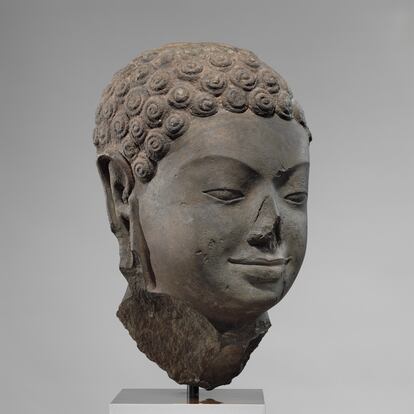New York’s Metropolitan Museum will return stolen ancient sculptures to Cambodia and Thailand
Many museums in the U.S. and Europe reckon with collections that contain objects looted from Asia, Africa and other places during centuries of colonialism

New York’s Metropolitan Museum of Art said Friday that it will return more than a dozen ancient pieces of artwork to Cambodia and Thailand after they were tied to an art dealer and collector accused of running a huge antiquities trafficking network out of Southeast Asia.
This most recent repatriation of artwork comes as many museums in the U.S. and Europe reckon with collections that contain objects looted from Asia, Africa and other places during centuries of colonialism or in times of upheaval.
Fourteen Khmer sculptures will be returned to Cambodia and two will be returned to Thailand, according to the Manhattan museum.
The repatriation of the ancient pieces was linked to art dealer Douglas Latchford, who was indicted in 2019 for allegedly orchestrating a multiyear scheme to sell looted Cambodian antiquities on the international art market. Latchford, who died the following year, had denied any involvement in smuggling.
The museum initially cooperated with the U.S. attorney’s office in Manhattan and the New York office of Homeland Security Investigations on the return of 13 sculptures tied to Latchford before determining there were three more that should be repatriated.
“As demonstrated with today’s announcement, pieces linked to the investigation of Douglas Latchford continue to reveal themselves,” HSI Acting Special Agent in Charge Erin Keegan said in a statement Friday. “The Metropolitan Museum of Art has not only recognized the significance of these 13 Khmer artifacts, which were shamelessly stolen, but has also volunteered to return them, as part of their ongoing cooperation, to their rightful owners: the People of Cambodia.”
This isn’t the first time the museum has repatriated art linked to Latchford. In 2013, it returned two objects to Cambodia.
The latest works being returned from the Metropolitan Museum of Art were made between the ninth and 14th centuries and reflect the Hindu and Buddhist religious systems prominent during that time, according to the museum.
Among the pieces being returned include a bronze sculpture called “The Bodhisattva Avalokiteshvara Seated in Royal Ease” made some time between the late 10th century and early 11th century. Another piece of art, made of stone in the seventh century and named “Head of Buddha” will also be returned. Those pieces can still be viewed in the museum’s galleries while arrangements are being made for their return.
Sign up for our weekly newsletter to get more English-language news coverage from EL PAÍS USA Edition
Tu suscripción se está usando en otro dispositivo
¿Quieres añadir otro usuario a tu suscripción?
Si continúas leyendo en este dispositivo, no se podrá leer en el otro.
FlechaTu suscripción se está usando en otro dispositivo y solo puedes acceder a EL PAÍS desde un dispositivo a la vez.
Si quieres compartir tu cuenta, cambia tu suscripción a la modalidad Premium, así podrás añadir otro usuario. Cada uno accederá con su propia cuenta de email, lo que os permitirá personalizar vuestra experiencia en EL PAÍS.
¿Tienes una suscripción de empresa? Accede aquí para contratar más cuentas.
En el caso de no saber quién está usando tu cuenta, te recomendamos cambiar tu contraseña aquí.
Si decides continuar compartiendo tu cuenta, este mensaje se mostrará en tu dispositivo y en el de la otra persona que está usando tu cuenta de forma indefinida, afectando a tu experiencia de lectura. Puedes consultar aquí los términos y condiciones de la suscripción digital.








































